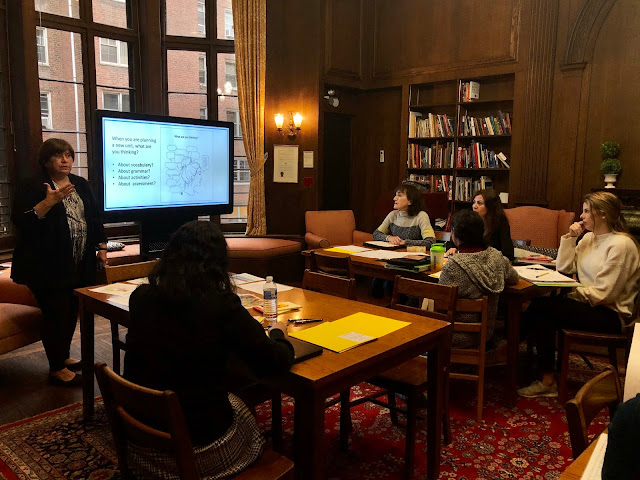Teaching and learning is not just about finding the right answers. It is about asking the right questions.
Schools must continuously reflect upon and review their curriculum in order to remain effective and innovative, and to ensure that they are preparing their students for success.
Today, our faculty participated in discipline-specific professional development workshops in which they analyzed their curriculum across grade levels, looking at the sequencing and content against desired outcomes. In each area of study, faculty closely examined what we teach and why we teach it, using a framework structured around Saint David's four pillars (academics, arts, athletics, spirituality) and our mission's call for the boys to "distinguish themselves as young men of ideas and ideals, action and reflection."
Some examples: Modern language teachers spent the day with Independent Consultant and World Language Specialist Leslie M. Grahn in a session that focused on purposeful planning of language units. They left with enhanced knowledge about releasing responsibility, effective routines for guided instruction, and ways to respond to various student learning needs through formative data.
Our Grade Five Opera Lab Team, an interdisciplinary group representing music, art and English, refined the upcoming winter sessions of our year-long collaboration with the Metropolitan Opera, which will culminate in our boys' mini production of an original operatic work this March.
Concomitant with the focus on what we teach and why we teach it, is the development of a pedagogical framework that explores how we teach. This strategic initiative, which will evolve into Saint David's Teaching Boys Institute, is beginning to take shape. TBI will enable us to leverage the wisdom of our master teachers while infusing our pedagogy with groundbreaking scientific research on how boys learn best. Front and center will be a concentration on relational teaching: we know that the relationship between student and teacher is most essential to a boy's success in school.
These are exciting times at Saint David's. Our focus on the what, why, and how in teaching and learning is establishing a strong culture of research and innovation, all within the moral context at the core of our school's mission. Ut viri boni sint.




